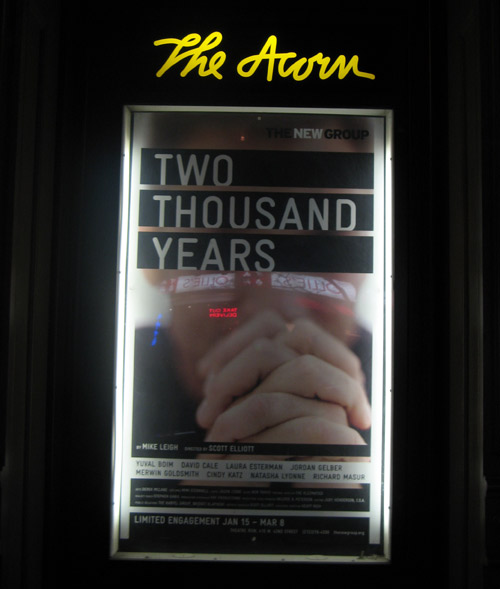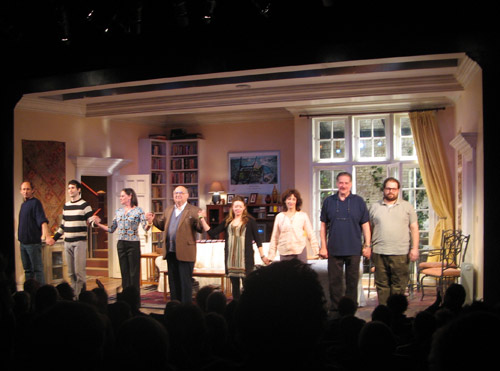Two Thousand Years
The B brothers had procured tickets to the five hour opera marathon that is Richard Wagner’s Die Walküre at The Met — immortalized in the classic 1957 Bugs Bunny cartoon “What’s Opera, Doc?,” a.k.a., “Kill the Wabbit,” #1 of the “50 Greatest Cartoons: As Selected by 1,000 Animation Professionals” in 1994. As neither of the men thought he had the endurance to make it through the entire Lorin Maazel-helmed evening, the three of us tentatively planned on swapping out of the seats and dividing the show’s acts among ourselves — two segments apiece, which no doubt would have confused the heck out of our fellow patrons in the front balcony. Ultimately, though, the opera relay plan did not come to fruition. (I was told afterwards that based on how much they did see, it was a pretty amazing show.)
Instead, I was at The Acorn in Theatre Row for The New Group’s American premiere of Mike Leigh’s Two Thousand Years, featuring onetime troubled actress Natasha Lyonne, which began previews on January 15.

Leigh has written more than 20 plays since 1965; the four which have been staged previously by the New Group — Ecstasy, Goose Pimples, Smelling a Rat, and Abigail’s Party — all date from his late 70s and 80s residence at London’s Hampstead Theatre. For the most part, Americans — I included — are more familiar with Leigh’s film work, such as Naked (1993), Secrets and Lies (1996), Topsy-Turvy (1999) and Vera Drake (2004).
Commissioned by the National Theatre back in 2001, Two Thousand Years is the playwright’s first play in over a decade. As such, there was quite a bit of excitement in theatre circles when its imminent arrival was announced in 2003; before the play even had a title, and with no information available about its content, it managed to sell out the entire 16,000 tickets of its London run.
This is the first of Leigh’s works — film or theatre– to deal exclusively with his Jewish background. The story concerns a well-to-do, intellectual Jewish family in the Northern London suburb of Cricklewood, and the domestic trauma that ensues when their brooding, unemployed, university-educated son becomes religiously observant. The rest of the family is decidedly secular: although several members have spent time on Israeli kibbutzes, and all of them casually toss Yiddish words into conversation, they eat bacon and do not attend synagogue; their “Jewishness” seems mostly reflected by their close reading of The Guardian‘s coverage on the Gaza disengagement, bewailing the loss of their Zionist ideals, and loudly shouting during family gatherings. (That last is a stereotype that’s been reinforced endlessly on American sitcoms such as Will & Grace and Frasier. I know: I’ve watched the late night syndicated episodes more times than I care to admit.) When the son starts sporting a kippah (yarmulke) and skulking out into the patio for morning prayers, his parents are at a loss over how to react. (“It’s like having a Muslim in the house… or a martian,” balks the father; the mother, in the meantime, frets over what her son will be able to eat.) In addition, there are the usual family conflicts: sibling rivalries, an estranged aunt (who makes a sudden, unexpected appearance in the second half) and an argumentative grandfather.

An intriguing premise and excellent acting throughout, with scene fade-ins and outs punctuated by original music by the New York-based Klezmatics. Based on the frequent outbreaks of laughter, the audience seemed to enjoy it quite a bit, while the play’s analysis of the strains of religion and family life were both thought provoking and moving.
There are no comments just yet.
Go for it ...
Search
Popular Tags
Categories
Archive
- July 2010
- July 2009
- January 2009
- November 2008
- September 2008
- August 2008
- July 2008
- June 2008
- May 2008
- April 2008
- March 2008
- February 2008
- January 2008
- December 2007
- November 2007
- October 2007
- September 2007
- August 2007
- July 2007
- June 2007
- May 2007
- April 2007
- March 2007
- February 2007
- January 2007
- December 2006
- November 2006
- October 2006
- September 2006
- August 2006
- July 2006
- June 2006